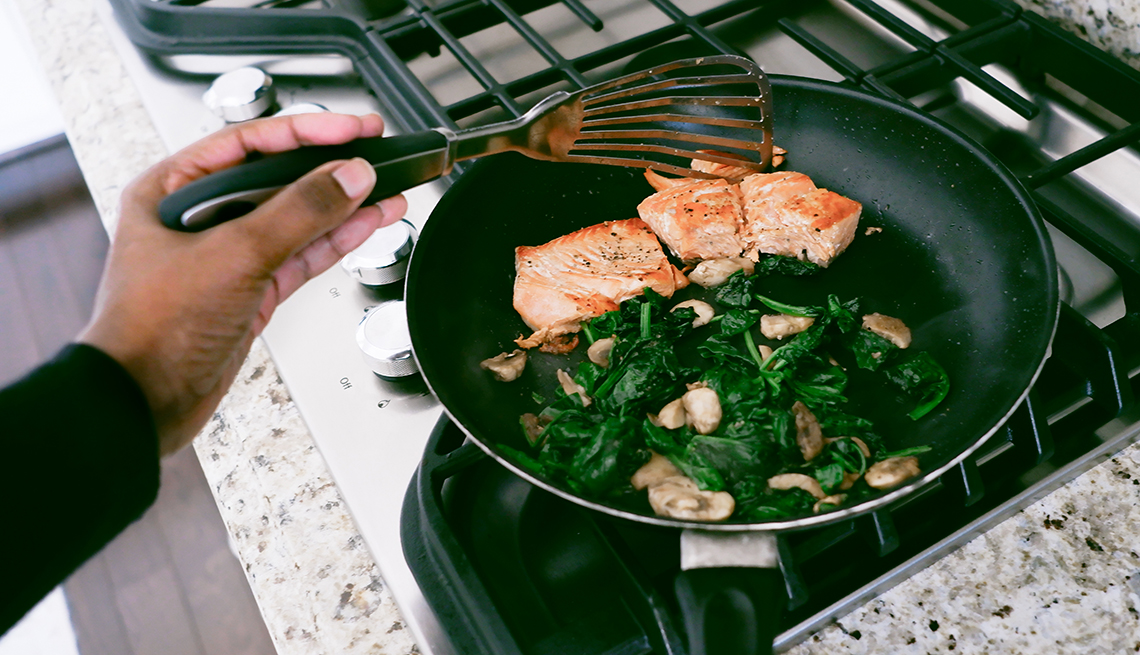AARP Hearing Center
You are what you eat, the saying goes — and that holds true for the neck up. Just as diet plays an important role in the health of your heart, your skin and other organs in the body, what you put in your mouth can affect the health of your brain.
In fact, a new study published in the journal BMJ found that among several healthy lifestyle habits, a healthy diet had the strongest effect on slowing memory decline in older adults. What’s more, the benefit was seen even among adults at increased genetic risk for dementia.
How so? For one, healthy foods help to keep blood vessels healthy. These tiny tubes transport nutrients throughout the body, including to the brain. “Our brain is fed by blood vessels, and the delivery of nutrients and oxygen to our brain cells depends on the integrity of [these blood vessels],” says Irwin Rosenberg, M.D., professor emeritus of nutrition and medicine at Tufts University's USDA Human Nutrition Research Center on Aging (HNRCA) and the Friedman School of Nutrition Science and Policy.
Accumulating research also points to a powerful connection between the brain and the digestive system (commonly called the gut), which is happiest when fed nutrient-dense foods. “Like teens who love to text each other all the time, [the brain and the gut] are constantly sending chemical messages back and forth,” says Uma Naidoo, M.D., director of nutritional and lifestyle psychiatry at Massachusetts General Hospital in Boston and author of This Is Your Brain on Food. “And the health of one is reflective of the health of the other.”
It's also possible that certain diets trigger inflammation, cell and tissue damage, and other biological processes linked to worsening brain health, the National Institute on Aging says.
The good news: Eating to support your brain is “actually really simple,” says Shelly Wegman, a clinical dietitian with UNC REX Nutrition Services in Raleigh, North Carolina. “It’s choosing minimally processed or unprocessed foods,” Wegman adds, and minimizing the consumption of salty, sugary, ultra-processed options, which have been associated with higher dementia risks and depression.
And while there is no one silver-bullet food that gives the brain a boost (“It’s really the diet,” Rosenberg emphasizes), there are a few food groups that stand out.
Fish
What Is Cognitive Health?
The mental processes that are collectively known as cognition include:
- Ability to learn new things
- Intuition
- Judgment
- Language
- Remembering
Source: Centers for Disease Control and Prevention (CDC)
Plenty of fish are rich in omega-3 fatty acids, an essential type of fat that, over decades of research, has been connected to better cognitive health.
Most recently, a study published in the journal Neurology found that middle-aged adults who ate a diet rich in omega-3 fatty acids had larger hippocampal volumes (the hippocampus is the part of the brain that plays an important role in learning and memory) and were better able to understand complex concepts.
“Studies have looked at this association in older populations. The new contribution here is that, even at younger ages, if you have a diet that includes some omega-3 fatty acids, you are already protecting your brain for most of the indicators of brain aging that we see at middle age,” said Claudia Satizabal, lead study author and assistant professor of population health sciences with the Glenn Biggs Institute for Alzheimer’s and Neurodegenerative Diseases at UT Health San Antonio, in a newsletter report about the study.









































































